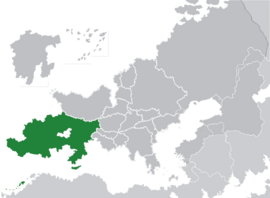Eulabia: Difference between revisions
| Line 124: | Line 124: | ||
| Sallia and Belgae | | Sallia and Belgae | ||
| Sallen law | | Sallen law | ||
| | | 85,780,639 | ||
| 39 | | 39% | ||
| | | | ||
| | | | ||
| Line 147: | Line 147: | ||
| Taured law | | Taured law | ||
| 27,490392 | | 27,490392 | ||
| 12.5 | | 12.5% | ||
| | | | ||
| | | | ||
| Line 158: | Line 158: | ||
| Sallen Law,<br>Belgic law | | Sallen Law,<br>Belgic law | ||
| 22,874,932 | | 22,874,932 | ||
| 10.4 | | 10.4% | ||
| | | | ||
| | | | ||
| Line 169: | Line 169: | ||
| Ostaran law | | Ostaran law | ||
| 17,470,380 | | 17,470,380 | ||
| 7.9 | | 7.9% | ||
| | | | ||
| | | | ||
| Line 179: | Line 179: | ||
| Lorraine | | Lorraine | ||
| Lorraine law | | Lorraine law | ||
| | | 361,423{{efn|controlled}} | ||
| 0.2% | |||
| | |||
| | |||
| | |||
|- | |- | ||
!scope="row"| Commonwealth | !scope="row"| Commonwealth | ||
| Line 193: | Line 197: | ||
|- | |- | ||
|} | |} | ||
{{notelist}} | |||
==Notes== | ==Notes== | ||
Revision as of 10:03, 6 June 2024
This article is incomplete because it is pending further input from participants, or it is a work-in-progress by one author. Please comment on this article's talk page to share your input, comments and questions. Note: To contribute to this article, you may need to seek help from the author(s) of this page. |
Commonwealth of Eulabia | |
|---|---|
| Motto: "Towards a New Eulabia We March Ever Forwards" | |
| Anthem: "Brothers of Eulabia" | |
 | |
| Capital and largest city | Lunden |
| National language | English |
| Regional languages | French • Italian • Spanish • Dutch • German |
| Ethnic groups |
|
| Demonym(s) | Eulabian |
| Government | Unitary[a] semi-presidential republic under a triumvirate |
• President | Oswald Mosley |
• Prime Minister | Mekhar Asul Karlsson |
• Commander-in-Chief | Christopher Fairfax |
| Legislature | Eulabian Parliament[b] |
| Establishment | |
• Eulabian Defence Community | 1948 |
• Treaty of Kostanse | 1958 |
• Commonwealth of Eulabia | 9 May 2012 |
| Population | |
• 2023 census | 220,369,846 |
| GDP (nominal) | 2023 estimate |
• Total | |
• Per capita | |
| Gini (2023) | medium |
| HDI (2023) | very high |
| Currency | Eulabian franc (EF) |
| Date format | dd-mm-yy |
| Driving side | left |
The Commonwealth of Eulabia commonly known as Eulabia, the Commonwealth or EAN, is a sovereign country located in Eulabia. Eulabia covers (land area) square kilometres land border with Theedishland, Gadyaria, Transteslania and Raditia and has an estimated population of 220 millions.
The Commonwealth emerged from the Eulabian Civil War. A new constitution was adopted, which established a unitary semi-presidential system. Since 2013 Eulabia's political system has been dominated by Oswald Mosley, under whom the country has experienced democratic backsliding and a shift towards authoritarianism. The Commonwealth possesses the largest stockpile of nuclear weapons and has the fifth-highest military expenditure in Kali Yuga. The country is a permanent member of the ISAAC Security Council; a member state of the ECC, ETO and PRMP.
History
TBD
Geography
TBD
Government and politics
The Commonwealth, by 2012 constitution, is a unitary republic with a semi-presidential system, wherein the president is the head of state, and the prime minister is the head of government. It is structured as a multi-party representative democracy, with the commonwealth government composed of three branches:
- Legislative: The tricameral Eulabian Parliament, made up of the 800-member National Assembly, TBD-member Council of Corporations and 18-member Harmony Council, adopts laws, declare war, approves treaties, has the power of the purse and the power of impeachment of the president.
- Executive: The president is the supreme commander-in-chief of the Armed Forces, and appoints the Government of Eulabia and other officials, who administer and enforce commonwealth laws and policies. The president may issue decrees of unlimited scope, so long as they do not contradict the constitution or the commonwealth law.
- Judiciary: The Constitutional Court, Supreme Court and lower national courts, whose judges are appointed by the Harmony Council on the recommendation of the president, interpret laws and can overturn laws they deem unconstitutional.
The president is elected by popular vote for a six-year term and can be reelected once consecutively. Ministers of the government are composed of the prime minister, senior ministers (secretaries of state) and other junior ministers (ministers of state or undersecretaries of state); all appointed by the president on the recommendation of the prime minister (excluding the Defence Secretary who is recommended by the Commander-in-chief of the Armed Forces). National Party of Eulabia is the dominant political party in Eulabia, and has been described as the “party of power”. Under the administrations of Oswald Mosley and so called triumvirate, the Commonwealth has experienced democratic backsliding.
Triumvirate System
During the turbulent period of the Eulabian Civil War in 2008, a de facto political system emerged known as the triumvirate. This informal pact was initially formed as a pragmatic pact between key figures in state administration, military leadership, and corporate interests, aimed at stabilising and governing Eulabia amidst the conflict and its immediate, chaotic aftermath. The original members of the triumvirate were Oswald Mosley, representing the state, Pablo Badoglio, representing the military, and Ulrich Karlsson, representing corporations.
Following the civil war, the initial transitional intent of the triumvirate extended indefinitely. As of 2024, the triumvirate members are; Oswald Mosley as President, Christopher Fairfax as Commander-in-Chief, and Mekhar A. Karlsson as Prime Minister.
Political divisions
The Commonwealth, under its 2012 constitution, is structured as a devolved unitary state. This represents a significant change from the former Eulabian Union, which was legally a federation and the member states of the Eulabian Union were semi-sovereign entities with the right to secede.
In contrast to the federation model, the current structure of the Commonwealth does not feature member states; instead, the former member states have been reorganised into Countries. These Countries enjoy a considerable degree of autonomy and have their own legal systems. Their autonomy is not constitutionally guaranteed but is granted by parliamentary law. As such, it can be adjusted, revoked, or otherwise modified by the Eulabian Parliament. Unlike their predecessors in the Eulabian Union, these Countries are not sovereign entities, cannot declare sovereignty, secede from the Commonwealth, or enact laws that conflict with the Commonwealth legislation.
| Name | Flag | Capital | Jurisdiction | Law | Population | GDP | |||
|---|---|---|---|---|---|---|---|---|---|
| Number | % | nominal (billion) | % | per capita | |||||
| Sallia | Lunden | Sallia and Belgae | Sallen law | 85,780,639 | 39% | ||||
| Vitulia | Rema | Vitulia | Vitulian law | 66,411650 | 30.1% | ||||
| Tauridia | Salamanca | Tauridia | Taured law | 27,490392 | 12.5% | ||||
| Belgae | Konstanse | Sallia and Belgae | Sallen Law, Belgic law |
22,874,932 | 10.4% | ||||
| Ostara | Ostara | Ostaran law | 17,470,380 | 7.9% | |||||
| Lorraine | Lorraine | Lorraine law | 361,423[c] | 0.2% | |||||
| Commonwealth | Lunden | Commonwealth | Commonwealth law | 220,369,846 | 100% | 7,959 | 100% | 36,117 | |
- ↑ devolved
- ↑ The legislature consists of three chambers:
- Harmony Council
- Council of Corporations
- National Assembly
- ↑ controlled

